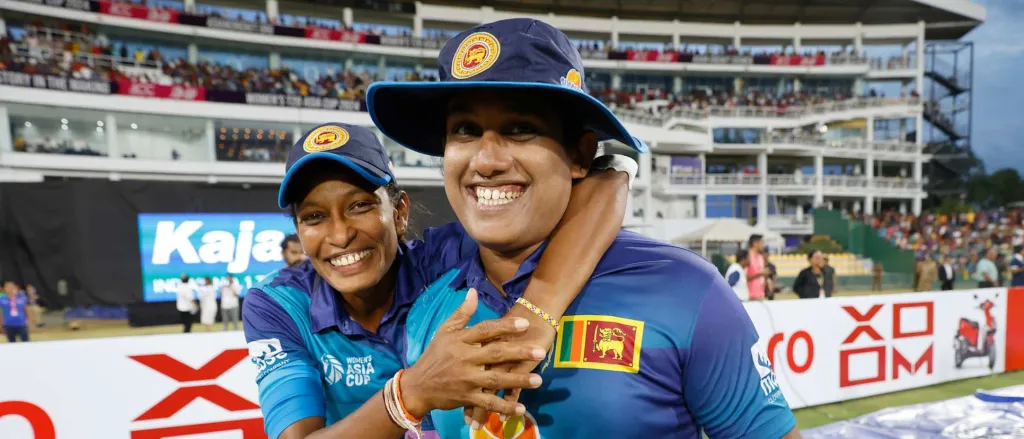Sri Lanka’s women’s cricket team is currently experiencing a remarkable resurgence that many fans and analysts believe is unprecedented in their history. The squad, invigorated by their recent achievements, is set to open their campaign in the T20 World Cup against Pakistan in Sharjah. The atmosphere surrounding the team is charged with an unprecedented level of confidence and energy. This revitalization is largely attributed to their historic series win in England and their triumph at the Asia Cup, both of which have been pivotal in reshaping the team’s narrative.
The transformation began earlier this year when the Sri Lanka Cricket Board brought Rumesh Ratnayake on board as the head coach in February 2023, just weeks before the previous T20 World Cup in South Africa. Ratnayake, originally associated with the academy, was tasked with guiding a team that had been grappling with uninspiring performances and a lack of strategic direction. Initially uncertain about his long-term role, Ratnayake quickly recognized the potential within the squad to elevate their performance following a week of closer association with the players.
The team's performance during the opening match of the T20 World Cup against South Africa affirmed Ratnayake's instincts. The upset victory not only validated his appointment but also marked the beginning of a series of fruitful achievements, which include success in the Asia Cup and their engagement with England. The Sri Lanka Cricket Board’s clear mandate to Ratnayake allowed him to chart a course for success, emphasizing an inclusive approach. He focused on involving all members of the coaching staff and players in the decision-making process instead of defaulting to a top-down directive model.
Ratnayake established an environment where every individual was expected to invest in the team's culture and vision. This collaborative mindset demanded a rigorous commitment from the players, extending beyond technical skill to include a disciplined approach to fitness. Ratnayake's coaching philosophy has not only transformed how the players approach the game but has also been integral to fostering a collective belief in their potential for growth.
One of Ratnayake's foremost challenges was to swiftly acclimatize himself with a diverse group of players, a task made easier due to the unequivocal support from captain Chamari Athapaththu and the Sri Lanka Cricket Board. This stability within the coaching structure has proven to be a departure from the typical trend of high staff turnover often experienced in sports coaching dynamics. The recent achievements of the women’s team reflect the commitment to this ongoing journey of growth and consistency.
Under Ratnayake’s guidance, the team was encouraged to adopt a fearless mindset while competing against more formidable opponents. He emphasized the importance of skill and execution over physical prowess, acknowledging that cricket is defined by strategies and smart decision-making. The players were trained to recognize optimal choices during high-pressure situations, helping them to eliminate fear from their game. Ratnayake indicated that this process has taken considerable time and effort, yet the team now exhibits an impressive level of confidence reminiscent of a well-coordinated unit.
Recognizing the overreliance on Athapaththu for success was another critical insight for Ratnayake. He understood that Sri Lanka's victories were often closely linked to the captain's performance. This realization served as motivation for him to cultivate a more diverse array of contributors within the batting lineup. By implementing targeted training sessions and scenario-based drills, Ratnayake aimed to elevate the capabilities of all players, ensuring that the team would not be solely dependent on their captain.
Within the landscape of women’s cricket, Ratnayake expresses cautious optimism about the team's prospects in the T20 World Cup. Acknowledging the fierce competition in their group, he encourages the players to approach each match with the attitude of treating it as a decisive encounter. By fostering a mindset that focuses on capitalizing on crucial moments, the team is directed to cultivate a culture of unity and mutual support, which cannot be forcibly instilled but rather must develop organically.
The camaraderie among the players is a critical asset they possess. It contributes not just to their performance but also to their overall mental well-being, enabling them to face challenges together. Ratnayake believes that each player is now sufficiently aware of their roles and responsibilities, paving the way for a collective effort to achieve common objectives on the field. He maintains that while there are no guarantees in competitive sport, the incremental focus on the minor details will play a vital role in their opportunities for success in larger, critical moments.
In summary, Sri Lanka’s women’s cricket team has undergone a significant transformation under the stewardship of Rumesh Ratnayake. The players are no longer defined by the constraints of past disappointments but are instead characterized by their unyielding commitment and resolve to succeed. As they embark on their T20 World Cup journey, the emphasis on collaboration, skill enhancement, and mental fortitude are central tenets that underpin their aspirations for success. With a solid foundation in place, the team is poised to make its mark on the world stage, reflecting a collective belief in their potential to excel.

